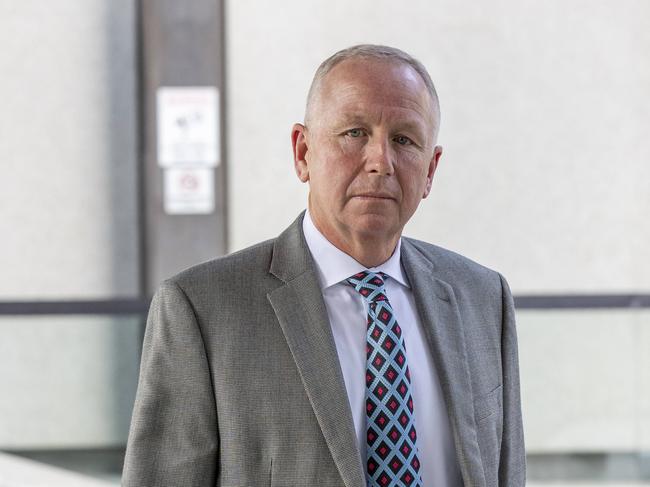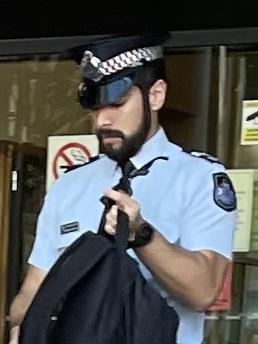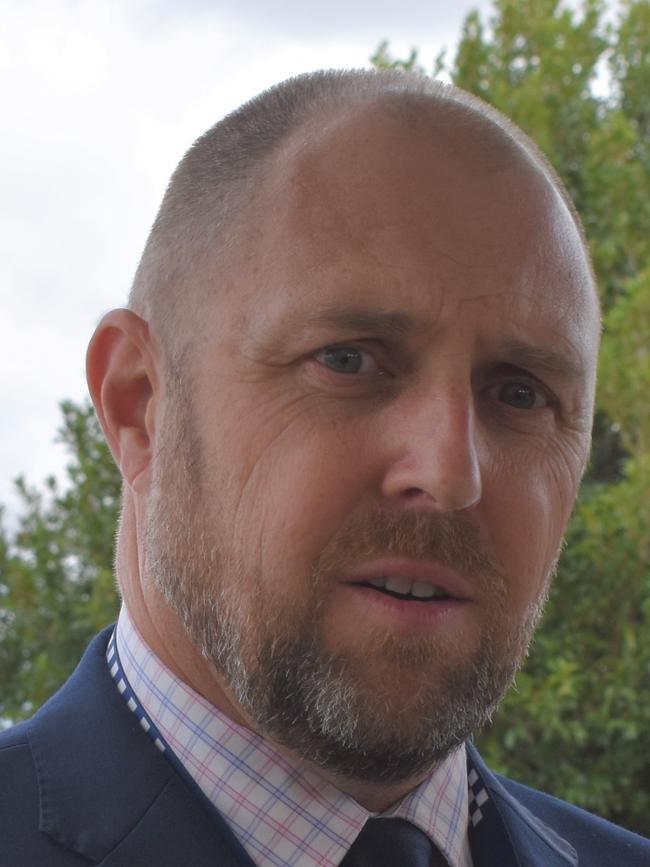Rockhampton police death in custody inquest hears from Dr Stephen Rashford, about new QPS training
A term adopted in the 1980s by police across the globe used to identify offenders likely under the influence of drugs, restrained and could die in custody was the crux of an inquest this month. It comes as QPS and QAS team up for new training.
Police & Courts
Don't miss out on the headlines from Police & Courts. Followed categories will be added to My News.
A term adopted in the 1980s by police services across the globe used to identify offenders who were likely under the influence of drugs, restrained and likely to die in custody was the crux of a recent Central Queensland inquest.
The inquest into a man who died in a police pod en route to the Rockhampton watch house was held this month, where officers involved, along with Queensland Police Service training experts and the state’s most qualified emergency medical responder, Queensland Ambulance Service medical director Dr Stephen Rashford, gave evidence about what happened the night of November 8, 2019.
The deceased man cannot be named for legal reasons and will be referred to by this publication as Adam.
Adam died alone, in the dark, struggling to breath - a fact which still haunts one of his siblings almost three years after his death.
He was a father, a brother, a football player and a fly-in fly-out worker.
Adam had been placed in the police vehicle to be driven across the road from the Leichhardt Hotel car park in Bolsover Street, Rockhampton and into the watch-house bay.
Body worn footage played at the inquest showed Adam’s demeanour quickly changed to one of being anxious, believed by Dr Rashford to be a sign of claustrophobia.
The inquest heard Adam had three ‘flags’ against his name in the QPS QPrime database for mental health issues – two were Emergency Examination Authorities, which are legal mechanisms available when police encounter someone who presents with symptoms of a major disturbance in their mental capacity, to be taken against their will to an emergency department for examination.
The footage showed Adam trying to remove himself from the space sparking his fear, only to be confronted by four police officers who had escorted him to the pod for transport.
What followed was described by Dr Rashford as a “significantly exhausting” struggle between the man and the police officers, which two other officers joined before the man was restrained.

Ethical Standards Command’s Detective Sergeant Neil Parker, who investigated the incident and prepared a report for the coroner on behalf of the Queensland Police Service, said once Adam had been restrained and was on the ground, that was probably an opportunity to reassess Adam, as well as after he dropped his knees while being transported to the pod.
However, he also believed the officers exhibited “the appropriate standard of care in line with their duties on the evening”.
Detective Sergeant Parker added that further training would have assisted in the officers identifying some potential signs of a medical episode, plus cameras installed in the pod providing better observations during transportation would have helped.
Footage showed snippets of the struggle with many body parts obscuring the vision while repeated shouts of “help me” and “murder”, along with “you aren’t real cops” can be heard coming from the man.
It was believed this struggle lasted five to seven minutes, before Adam was restrained and assisted back to the pod where he lost consciousness simultaneously as officers pushed him inside on his back.
Dr Rashford, who was giving expert evidence based on what he observed in the footage, he believed Adam was near cardiac arrest at this point in time.
Adam was discovered unresponsive and with no pulse upon arrival at the watch-house.
The inquest heard police, followed by QAS responders, performed CPR on Adam, but he was declared deceased in the watch house garage.
Officers involved in Adam’s arrest were all questioned about what happened that night, with most stating they thought Adam was intoxicated with illicit drugs.
As a result of their answers, they were questioned about if they had assessed him to meet the criteria, according to QPS training, for ‘excited delirium’.
They were also asked about their training in excited delirium and post arrest collapse medical risk factors, if they knew how to identify those and if they had assessed Adam for potential post arrest collapse.
The coroner also asked a medical expert if excited delirium was still relevant.
What is excited delirium?
According to the journal Psychological Medicine, police forces adopted the Hippocratic term excited delirium – used to describe febrile, agitated and disoriented patients – in the 1980s, to explain people intoxicated with illicit substances who had erratic or violent behaviour, were restrained by police and died in police custody.
The journal article ‘Excited Delirium, acute behavioural disturbance, death and diagnosis’ went on to explain the blood concentration of cocaine in such offenders was about 10 times lower than the lethal level and other factors might have contributed to the fatal outcome.
Those other factors, according to the article, included the police use of neck-holds, chokeholds or ‘hog-tying’.
Excited Delirium and the QPS
During the inquest, the court heard officers were to use listed symptoms from categories outlined in the Queensland Police Services’ care guide to determine if a person was experiencing excited delirium or other issues requiring medical assessment.
The QPS Operational Procedures Manual deals with excited delirium and ‘acute psychostimulant-induced episodes’ in Chapter 14.
The manual states: “toxic (poisonous) levels (of psychostimulants), an individual may become extremely agitated, irrational, impulsive and paranoid, which may lead the person to behave in an aggressive and/or violent manner”.
“It is usually impossible to discriminate between drug-induced and naturally occurring (mental health) psychosis, but both conditions are potentially lethal and should be considered a medical emergency. The response to and management of either condition by police is the same.
“These conditions are commonly known as ‘excited delirium’ and will be referred to mean acute psychostimulant-induced and acute psychotic episodes for the purpose of this policy.”
The manual sets out physical symptoms of excited delirium and effective communication strategies police can use.
At the bottom of that section, it advises officers to then look at the section on post arrest collapse (medical risk factors).
Senior Constable Sarah Ryan, who was driving the vehicle transporting Adam on the night of his death, was questioned about the post arrest collapse guide by counsel for the police, Stephanie Williams, who explained how it was set out in terms of symptoms to watch out for.
Ms Williams said the symptoms were set out in a quadrant format with the first titled ‘alcohol related’.
She said the second heading on the top right was ‘struggling’ with ‘behaviour related’ in the bottom left and ‘physical related’ for the final quadrant.
Constable Ryan told Counsel assisting the coroner, Julie Pietzner-Hagan when she was questioning her about the Care Guide and Adam’s condition, that Adam displayed symptoms that he may be physically unwell.
During her testimony, Constable Ryan also listed the struggle and Adam’s large size both as physical indicators, and sweating.
She said she did not have any regard to alcohol indicators, nor drugs.
Ms Pietzner-Hagan asked Constable Jade Traynor about a point in her interview with the Ethical Standards Command where she was asked if she thought Adam experienced excited delirium or symptoms of post arrest collapse and Constable Traynor had responded “maybe walking to the car”.
“Can you recall what your concerns were?” Ms Pietzner-Hagan asked.
Constable Traynor said she might have been speaking in hindsight.
“At the time, I didn’t think that’s what it was but looking back it fits the categories,” she said.
“I thought it was drug induced and that he didn’t want to go into custody.”
Ms Pietzner-Hagan put to Constable Traynor there was a category in the care guide related to drugs and indicated how Adam should have been monitored while in the back of the police vehicle to which Constable Traynor respond: “in hindsight, yes.”
Ms Pietzner-Hagan then asked Constable Traynor what training she had received to recognise the signs of rapid deterioration in someone who could be experiencing reduced levels of consciousness.
Constable Traynor said only at the academy when taught what was in the care guide, and first aid.
Another officer – a first year constable who arrived late at the scene having responded to a radio call for help – did not, at the time, think Adam was suffering from excited delirium.
Ms Williams, while questioning Senior Sergeant Tracy Bailee, training co-ordinator in the QPS Operational Training Services department, went through Adam’s criminal record of convictions for obstructing police and assaulting police between 1994 and July 2017.
Ms Williams asked Senior Sergeant Bailee if she believed Adam’s behaviour in the November 2019 incident was more consistent with his criminal record than excited delirium.
Senior Sergeant Bailee said ‘yes’.
Lessons Learned by officers and how they’ve used that in the field since
Two of the officers questioned during the inquest were able to explain what lessons they learned from the incident with Adam, and how they have used that in the field.
Senior Constable Renzo Martinez, now stationed at Caboolture, was one of them.

He said since that incident, he was “extremely uncomfortable” and would no longer transport anybody inside a pod while they are lying on their side or not in sight of the rear-view mirror.
“The most recent example … was in Caboolture, again on night work, and again, in a similar situation where I had arrived after the fact … after a violent struggle,” Senior Constable Martinez told the inquest.
“The offender, who was intoxicated by something, had smashed a window … punched a female officer to the head, knocking her to the ground and rendering her unconscious for a short period of time.”
He said the offender was tasered at one point and there had also been a violent ground struggle, this one short in time period, after which the offender was restrained and forcefully moved into a pod, while still “combative”.
“He attempted to headbutt, with a lot of force, another female officer (before being placed in the pod),” Senior Constable Martinez said.
“Once the door was closed, he was on his side and yelling abuse.
“The situation was controlled … so that gave me the opportunity to, I guess you could say separate myself from the rest of the incident or the investigation.
“I began speaking to him through the door, asking him to sit up on the seat that was provided.”
He said he could not recall the exact time frame of it all, but he gave the offender time to calm down and stop being abusive.
Senior Constable Martinez said the offender told him the handcuffs were too tight, which was not “uncommon for initial applications of the handcuffs during a violent ground struggle”.
He said he negotiated with the offender, offering to change his handcuffs if he sat up on the seat.
“He agreed to that,” Senior Constable Martinez said.
He said he arranged for another officer to help.
Senior Constable Martinez said he opened the door, assisted the offender into a seated position and got him to face away so he could change the handcuffs over.

“At that point, he was no longer combative, certainly not abusive towards me, and he remained on the seat and I was able to observe him the entire drive in the rear view mirror,” he said.
Another officer who told the inquest she learned lessons from the incident with Adam was the first year constable who had been working on the Rockhampton Police Station front counter that night and ran over when the radio call for help was issued.
She said she now knew what signs to look for with regards to excited delirium.
She told the inquest that about a month ago, she attended a scene where a female was running across the highway in a heightened state.
“We had to wrestle her,” the constable told the inquest.
She said after restraining the female, she kept talking to her and making sure she was okay.
The constable said QAS was called to give the female medical assistance and took her to hospital.
Medical expert’s view
Coroner Terry Ryan asked Dr Rashford if he believed the concepts of excited delirium, along with positional asphyxia (obstruction of breathing due to a restraint technique), were still as relevant as they were in the past.

“I think that it’s a very gross oversimplification of what the presentation is,” Dr Rashford said.
“But if excited delirium does occur, it’s only a very small … subset of people who present with acutely disturbed behaviour.
“But most of the other people who present, they may not meet the definition of an excited delirium still are a risk.”
What’s to come
The inquest heard QAS and QPS had been working together in recent years to develop new, modern training for police which targeted post arrest care and collapse.
Inspector Anthony Buxton – manager of operational training services and chief Operational Skills and Practices instructor – said the new training program, which was still in draft form, was driven by coronial inquest findings, use of force reviews and some other data from Ethical Standards Command.

He said there had been or may be recommendations forthcoming from Coronial Findings that further training be provided for post arrest collapse, and “really specifically the deterioration in a very short period of time”.
The court heard the program, to be delivered online, was expected to be trial run by the end of 2022 and QPS staff would be required to make their way through a scenario built around post arrest care and rapid decline with QAS in attendance.
Dr Rashford said initially police were educated and trained in “tactical first aid”.
“The education has shifted to changes in behaviour, a change in physical presentation,” he said.
“I think it’s a start, but there needs to be a cultural change.
“I don’t envy their (police) role.
“It’s a very difficult role, very difficult circumstances.
“We need to accept that police are never going to be able to train as paramedics
“But lived experience is incredibly powerful.
“Education is key.”




